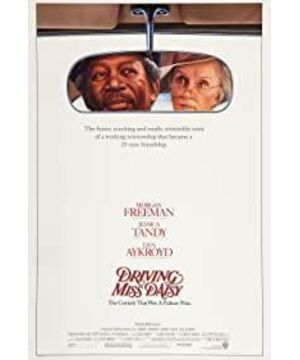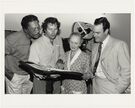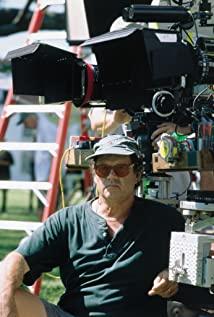I wonder what I'll be like when I'm too old to walk. Would I sit in a bright room with neat hair, light makeup, and a shirt dress reading a book of poetry? Will you still stick to your youthful hobbies, listening to music and embroidering flowers? Would you use a delicate bone china cup to make yourself a cup of hot tea on a snowy day? Would it be fun to fiddle with vegetables and flowers in a small garden on a sunny day?
These beautiful ideas are the true image of Daisy (Miss Daisy) at the age of 72. In the movie "Driving for Miss Daisy", we saw an elegant old lady who was rational, strict, stubborn and stubborn. The growth of age has not smoothed out her edges and corners, but only made her more aware of her principles and persistence, both in appearance and in spirit.
Daisy pays attention to appearance all her life. Even if she is 72 years old, even if she just goes out to buy a cleaning agent, she has the same rigorous dressing procedure as the Queen of England, including pearl necklaces, suits, hats, bags, gloves, all of which are indispensable. It is precisely because of these small restraints and graces that her little awkwardness, stubbornness and even small shortcomings in the film have become easier to be forgiven, making this hard old lady at first glance cute and vivid.
Spiritually, time has not been able to dilute her persistence, she is still proud that she is a Jew, not blindly obedient, not arrogant, sticking to her own beliefs and persistence. She goes to church every Sunday with dignity, she insists on listening to Martin Luther King Jr.'s speeches, she doesn't give gifts at Christmas, so when she gives Christian Hoke, her driver, she reiterates "This is not a Christmas gift, Jews never give Christmas gifts.". It is the coexistence of this small persistence and small flexibility that makes Daisy look real and lovely.
What I admire most is that even though economic conditions have greatly improved, she still holds on to her long-standing attitude towards wealth. Therefore, she particularly disliked Hoke saying that she was rich, and strictly prohibited him from driving a brand-new Cadillac to the church door to pick her up. She resented the waste at the Christmas party of her son and daughter-in-law. She even clearly remembered how many boxes of canned fish she had on special offer... The prosperous life did not obliterate her memories of the hard life in her youth. She firmly believed that every penny was hard-earned, that thrift was a virtue, and that extravagance and showing off wealth were vulgar behaviors that would be admired by everyone, even herself. Shame. Even though the society is permeated with the fashion of showing off her wealth, she still insists on sticking to her heart and insisting on the "frugalism" advocated in Jewish culture.
Compared with the grace and stubbornness of the elderly Daisy, Hoke shows us another kind of life picture of aging. Unlike those old people with frowns and frowns, he is tolerant, positive, optimistic, flexible, and humorous, always arousing the warmest side of other people's characters. Time has taught him how to find happiness, how to use the most appropriate way to deal with people and turn enemies into friends.
Even when he first stepped into Daisy's big house, Idella, the maid who had taken care of Daisy for decades, told him "if I were you, I would never come here unless God himself called me", he still used his profession After 6 days, Daisy reluctantly got into his car and completed the task given by Miss Daisy's son. He is industrious, and does not take a break when he is not driving. He always tries his best to help the employer to do more things, such as growing tomatoes, such as cleaning chandeliers; he is proud and flexible, he Thinking that his labor deserves a higher salary, so he weaves stories of being poached, instead of begging Miss Daisy's son to give him a higher salary; he also has a little vanity, and always pretends to read the newspaper when he has nothing to do , when he was discovered by Miss Daisy in the cemetery that he was illiterate, he also argued that he could read the news even by looking at the photos in the newspaper.
These little features of perfection and imperfection make Hoke as real as the shrewd and slightly cute uncle that is common in your life. He let us know that even if the old people do not have a lot of wealth and high social status, they can still use the wisdom of life accumulated over the years to win happiness and self-esteem for themselves.
It just so happened that his optimism and tolerance were no more and no less than Daisy's stubbornness.
As a result, an elegant and wise old Jewish lady, an illiterate Christian old black, was arranged by fate to live under the same roof for many years. Daisy and Hoke, one white, one black, one rich and one poor, were so distinct when they first met, but after getting along, the two of them were like milk and coffee, adding a lot of smoothness to life.
This film warmly records the daily world of such two old people. There are no big ups and downs, but almost all the trivial things in life. Daisy patiently taught Hoke to recognize words; they attended the funeral of a maid who had been with him for many years; Daisy made fried chicken, and Hoke asked her to turn down the fire, she didn't listen at first, but when he left, she turned down the fire; They were muttering and growing tomatoes in the small yard; in the snowstorm, Hoke brought hot coffee to Daisy to accompany her against the cold and loneliness; Hoke took Daisy to Alabama to attend an old relative Walt's birthday party, On the way, they joked and got angry with each other; finally one day, Daisy took Hoke's hand and said, you are my best friend; finally, Hoke fed Daisy, who has been in the nursing home, thanksgiving pie with trembling hands .
When the cake was fed into Daisy's toothless mouth, I thought, a lot of people were like me, and their eyes got wet.
It turns out that the old world can also have so much warmth, and it flows slowly in life like this, unlike the dazzling fireworks of passion in youth. If you can let go of prejudice, let go of complaining, and feel it with a quiet and ordinary heart, you will appreciate this kind of warmth.
It turns out that sadness will make people cry, and warmth will also. "Driving for Miss Daisy" belongs to the latter category. It presents to us the little details of life that are plain but full of happiness one by one, making people feel that life is so beautiful, that getting old is not terrible, and this peaceful beauty is even more exciting than those full of exciting ups and downs. People have a long aftertaste.
After watching this film, I read a lot of comments. Some people said that in this seemingly warm film, the director actually used the characters of an old Jewish woman and a black driver to tell the story after World War II through the mouth of the American police. The racial ambivalence, "A sad sight of an old nigger driving with an old Jewish woman". In addition, in fact, behind the "master-servant friendship" is full of Americans' strict concept of hierarchy. For example, Daisy has always been in a leadership position in front of Hoke, maintaining a sense of superiority belonging to white people. Therefore, the reality hidden under the veil of warmth in the movie is even more cruel.
Maybe, maybe. Maybe these little details are the director's good intentions, but in the movie, the hot coffee that Hoke brought to Daisy in the wind and snow warmed Daisy and you and me; when Daisy held Hoke's hand , said "You are my best friend." The seriousness and persistence when saying "you are my best friend" also moved us. These warmth allow us to see another kind of feeling besides love and family, to see the simple trust and dependence between people, to see the vast sky and the sea, and to see the beauty of the world.
Even though there are always some cold and cruel realities in the world, there is a moment when you can truly feel the pure warmth and beauty, and you have already touched happiness, right?
I think that fate favors elegant women. Therefore, fate loves Daisy very much, and makes her meet the angel in her life-the tolerant and warm Hoke in her later years. This illiterate old black finally used his warmth and steadfastness to slowly melt Daisy's cold, arrogant and stubbornness (the previous black maid was a kind person who was eloquent and sweet, and he had been with him for many years but never softened Daisy).
By the end of the shot, my eyes were still on Daisy's gray hair and clean suit. It turns out that time travels to the end of life, and some people can still maintain their unique style. Getting old, it turns out that it is not a cruel and dilapidated exit; getting old is a crystal clear and elegant thing.
When the last shot slowly faded out, I couldn't help but ask myself again: When I get old, will I become such an elegant woman?
Daisy's persistence or Hoke's flexibility, which quality can make us look better when we grow old?
The correct answer has not yet been revealed.
However, don't worry, because we still have a long life to experience...
View more about Driving Miss Daisy reviews











